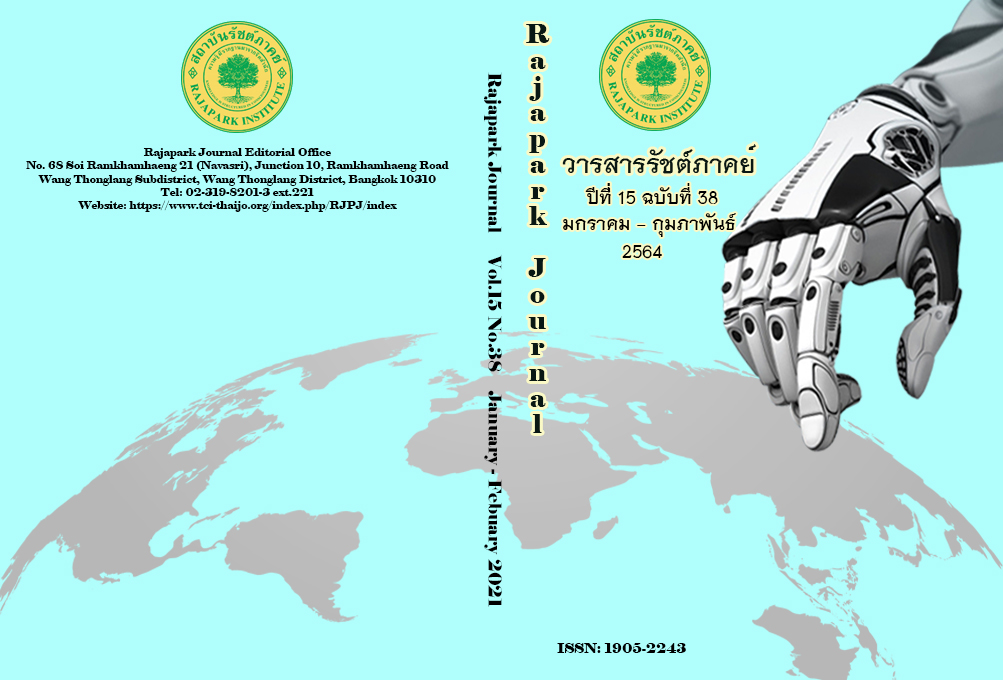Factors Affecting the Political Attentiveness of Thai Youths
Main Article Content
Abstract
This documentary research aimed to study factors affecting the political attentiveness of Thai youths to lay the foundation for strengthening democracy. Based on the related theories and document review, factors affecting the political attentiveness were comprised of 5 aspects which were 1) to hear the political news through social media, 2) to allow Thai youths to get involved in politics directly 3) to attend all political activities and events, 4) to vote or elect for an office, position, or membership locally and nationally, and other legislative draft referendum which directly affect to people 5) to raise the awareness of the democratic civic as this is a key to cultivate and transform Thai youths to be the democratic civic.
Article Details
Views and opinions appearing in the Journal it is the responsibility of the author of the article, and does not constitute the view and responsibility of the editorial team.
References
Arnstein, S. R. (1969). A ladder of citizen participation. Journal of the American Institute of Planners, 35(4), 216-224.
Changrien, P., Deewattanakul, P., Prachayapruit, T., & Bungchan, N. (2020). Relationships, forms of trust and political participation in the democracy of Thai society. Rajapark Journal, 14(35), 261-274.
Dhiravegin, L. (2006). The Development of Democratic Political Self. Retrieved February 18, 2021, from https://mgronline.com/daily/detail/9490000020980
Dhiravegin, L. (2009). Thai Politics and Democracy. Bangkok: Mr. Copy Printing.
Dhiravegin, L. (2015). Thai political reform: exit or stalemate. Bangkok: Prachatai Press.
Hansen, S. B. (1975). Participation, political structure, and concurrence. American Political Science Review, 69(4), 1181-1199.
Huntington, S. P. (1971). The Change to Change: Modernization, Development, and Politics. Comparative Politics, 3(3), 283-322.
Kanapon, R., Kenaphom, S., & Yupas, Y. (2017). Innovative of Building Local Administrative Partnerships in Mekhong Strategic Province of the Northeastern. Local Administration Journal, 10(3), 52-76.
Khantikul, P. (2010). A Political Participation Model of the People in Dusit District, Bangkok (Research Report). Bangkok: Suan Sunandha Rajabhat University.
Promkerd, P. (2020). Power of students: and guiding society. Retrieved November 19, 2020, from https://www.nationtv.tv/main/content/378791767
Sengphairogh, W. (2012). Political Consciousness and the Development of Democratic Political Culture among the Youths in Education Institutes in Bangkok during B.E. 2549-2554. Doctor of Philosophy Program in Political Communication. Political Communication College, Krirk University.
Srimahawaro, W. (2011). Thai politics, system or people: cultural development and political participation of the people. Journal of King Prajadhipok's Institute. 9(3), 63.
Tejapira, K. (2015). Thai constitution and looking forward. Bangkok: Thammasat University Press.
ThaiPublica. (2014). Supreme council peeling: empowering game, inspection and benefit. Retrieved July 5, 2020, from https://thaipublica.org/2014/04/inside-thai-parliament-3/
Thammayarit, T., & Bodeerat, C. (2018). Political Awareness Situation of Residents in Udon Thani Municipality. Local Administration Journal, 11(2), 55-71.
Wijitwatchararak, K. (2020). The Political Alertness of New Generation in Thailand. Journal of Yanasangvorn Research Institute, 11(1). 91-103.


